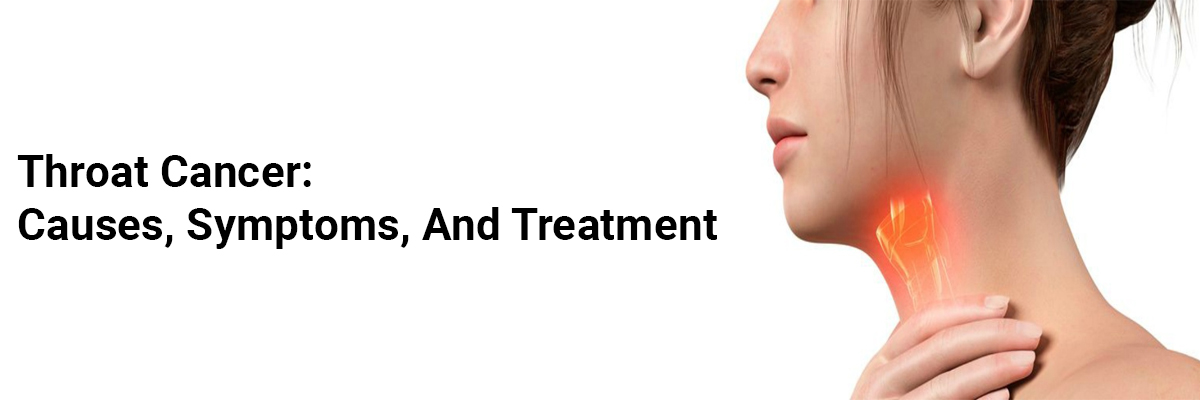
 IJCP Editorial Team
IJCP Editorial Team
Throat Cancer: Causes, Symptoms, And Treatment
Throat
cancer is a kind of cancer that begins in the throat. The throat (pharynx)
represents a tube that runs from the back of the nose to the food pipe
(esophagus) and the windpipe (trachea). A throat cancer or laryngeal cancer can
be classified depending on the affected area. There are specific terms to
differentiate the part of the throat where cancer originated-
- Nasopharyngeal
cancer
originates in the nasopharynx, a region of the throat located directly
behind the nose.
- Oropharyngeal cancer is a type of cancer that begins in the oropharynx, the part
of the throat located behind the mouth, which includes the tonsils.
- Hypopharyngeal cancer (laryngopharyngeal cancer) is a cancer that begins in the lower part of the throat, just above the
esophagus and windpipe.
- Glottic cancer is a type of malignancy that originates in the vocal cords.
- Supraglottic cancer originates in the upper portion of the larynx, usually involving the epiglottis, a flap of cartilage that covers the opening of the windpipe to prevent food and liquids from entering the airway.
- Subglottic cancer is a type of malignancy that originates in the lower part of the larynx, which is situated beneath the vocal cords.
Symptoms
of throat cancer
Throat cancer, or cancer of the larynx and pharynx, can present a variety of symptoms. These can include pain in the throat or near the breastbone accompanied by a sore throat and hoarseness that lasts for more than two weeks, difficulty and pain when swallowing, ear pain, a lump in the neck, a cough that does not go away, and coughing up blood-tinted phlegm. Some people may also experience shortness of breath, fatigue, and unexplained weight loss. It is crucial to be aware of these symptoms and seek medical attention if they persist.
Causes
and risk factors of throat cancer
Throat cancer is caused by the abnormal growth of cells in the throat, and several potential factors trigger the onset of throat cancer.
- Smoking and excessive alcohol consumption are two
of the most common culprits, as they can damage the throat lining and lead
to cancer.
- Certain viruses, such as the human papillomavirus
or Epstein-Barr virus (EBV), have sometimes been linked to throat
cancer.
- Family history or genetics plays a significant
role in increasing the risk of throat cancer.
- People with certain occupations, such as miners
and painters, may be at higher risk due to environmental exposure to
certain chemicals and dust.
- Poor oral hygiene and a diet low in fruits and
vegetables may also be contributing factors to the development of throat
cancer.
- Gastroesophageal reflux disease (GERD), a chronic
digestive disorder that occurs when stomach acid or, occasionally, stomach
content flows back into the esophagus, can also lead to throat cancer.
Diagnosis of throat cancer
A
specialist like an ear, nose, and throat (ENT) specialist or a head and neck
surgeon can carry out diagnostic tests for detection. Diagnosis of throat
cancer begins with a thorough medical history and physical exam, including a
visual and physical examination of the throat. Other tests, such as a biopsy,
imaging (CT scan, MRI, PET scan), sputum cytology, and blood tests, may be
performed to confirm the diagnosis.
- A biopsy is the removal of a small sample of
tissue for examination under a microscope and is the only definitive way
to diagnose throat cancer.
- Imaging scans such as x-ray, ultrasound,
computerized tomography (CT) scan, magnetic resonance imaging (MRI) scan,
and positron emission tomography (PET) scans can help detect tumors,
determine their size and location, and identify any enlarged lymph nodes
in the area.
- Sputum cytology is the examination of sputum
under a microscope to look for cancer cells.
- Blood tests may also be used to check for tumor
markers.
Treatment for throat cancer
Cancer
treatment relies on the size of cancer, its spread, and the patient's overall
health. It may include surgery, radiation therapy (radiotherapy), chemotherapy,
or a combination of one or more.
Surgery - Depending on the size of the tumor, surgery
may be recommended to have it removed. The type of surgery depends on the
cancer location and may involve removing a section of the pharynx or the
partial or complete removal of the larynx, thyroid, or tongue.
Radiation
therapy (radiotherapy) -
Radiation therapy may be used after surgery in some cases, while it may be the
principal treatment type in others.
Chemotherapy - In some instances, chemotherapy may be needed along
with radiation, mainly if the tumors are large or cancer has spread to the
lymph nodes. Chemotherapy may also be utilized to shrink tumors before surgery.
Recovery
following treatment for throat cancer-
Surgery
to treat throat cancer might be associated with some problems, such as:
- A sore throat
- Breathing difficulties, which might need a
breathing hole (tracheostomy) in the lower neck
- Problems eating, which might require a feeding
tube inserted (known as a nasogastric tube)
- Trouble swallowing
- Wounds that will heal in some time
Some
people with throat cancer may require therapy after treatment to relearn how to
speak. A speech therapist and a physical therapist can assist with this.
Occupational
therapists can assist with swallowing difficulty. In some cases, the patient
may need reconstructive surgery as well.
Tips to
Prevent Throat Cancer
There's
no proven way to prevent the occurrence of throat cancer. But its risk can be
reduced by observing the following-
- Stop smoking, or don't start smoking.
- Take alcohol only in moderation.
- Follow healthy diet habits incorporating fruits and vegetables in each meal.
- Protect yourself from HPV- by limiting the number of sexual partners and using a condom every time while having sex, and getting the HPV vaccine.

IJCP Editorial Team
Comprising seasoned professionals and experts from the medical field, the IJCP editorial team is dedicated to delivering timely and accurate content and thriving to provide attention-grabbing information for the readers. What sets them apart are their diverse expertise, spanning academia, research, and clinical practice, and their dedication to upholding the highest standards of quality and integrity. With a wealth of experience and a commitment to excellence, the IJCP editorial team strives to provide valuable perspectives, the latest trends, and in-depth analyses across various medical domains, all in a way that keeps you interested and engaged.






















Please login to comment on this article